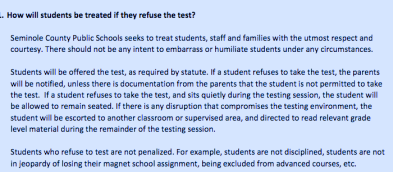(This post has been updated to include information from the FL DOE, reported in the Tampa Bay Times May 1, 2015)
Across the state of Florida, some parents of rising fourth graders are being informed that their child is being retained in the third grade because their FSA scores were in the bottom quintile (20%) of the state – no matter what that score may be. Some are being promoted, but are assigned to remedial reading class, often unnecessarily. Some middle and high school students are being made to sacrifice electives for remedial or Intensive Reading/Math.
In the absence of a valid FSA score, schools are making these critical decisions based on the data they have, which may be from progress monitoring tests, such as Achieve 3000 or Discovery Ed, etc. You may not even be aware that your child has been taking other standardized tests besides the FSA and classroom tests. Well, now you know. Some are even using FCAT scores from TWO years ago! How valid is THAT?!! In other words, districts have had to improvise in the face of no real guidance from the state, with little consistency from one district to the next. This is meaningless. If every student passed the test, there would still be a bottom 20% of those passing students, to whom a test would say, “You failed.” Children are being retained and remediated, regardless of what their actual scores are – in spite of the fact that the FSA validity report is not due back to the state until Sept. 1, 2015.
This is happening in certain districts and within those districts, only in certain schools.
But why is this happening and why is it happening so inconsistently?
From POLITICO Florida –
Schools in ‘holding pattern’ while they await testing study
Since state law requires the tests be used in determining whether third graders are promoted, the state Department of Education released to schools the lowest quintile of third graders’ scores,
those “at risk” of retention. The department also alerted schools where students passed ninth-grade English and algebra exams, which are graduation requirements.
For other grades, districts may choose whether to use the test scores in promotion decisions. Stakeholder groups said schools had to move forward without the scores…
Vince Verges, assistant deputy education commissioner for accountability, research and measurement, said it will be up to districts what to do with the results.
From the Tampa Bay Times article, Florida education department clarifies rules on student retention…
The Florida Department of Education issued its notes from an April 29 conference call, in which it aimed to explain the current state of affairs to superintendents. Here’s what it said:
Regarding third grade English Language Arts, it is clearly stated in the bill that we will determine the students who are in the bottom quintile to produce a list of students statewide who are at risk of retention. We will provide to each district their students that are in the statewide bottom quintile. The list will then be disaggregated by districts and provided to each of you as an alphabetical list of your students. You will receive the names of your students only, who are in the bottom quintile of the state. We will not be providing the percentile associated with each student, as that would be inappropriate when we consider that the scores have not been through all validity checks.
The law indicates that the list is to be provided for consideration by the district to then determine whether or not they will retain the student [emphasis added] or use other means as outlined in s. 1008.25(6)(b), F.S., for grade placement in either third or fourth grade and to be considered with other information that the district has for each student to provide supports for success in fourth grade. The statute is clear that for this year of transition the districts will notify parents and provide evidence.
___________________
House Bill 7069 states:
“Each student who does not achieve a Level 3 or above on the statewide, standardized English Language Arts assessment….must be evaluated to determine the nature of the student’s difficulty, the area of academic need, and strategies for providing academic supports to improve the student’s performance.”
1) It does not say that all students scoring below a level 3 will be placed in remedial reading class.
2) Remedial reading class is not an evaluation.
3) At this time scores have not been released…. no 1,2, 3, etc.
4) If your student has been put into remedial reading, without just cause, and you don’t feel it would benefit your child…..SAY NO.
Confusion and misapplication of the law is happening because districts have been left to decide for themselves, what to do about the children who were flagged for being in the bottom quintile – no matter what their actual scores are – Do we promote, retain or remediate them?
In spite of decades of solid research by child development and education experts, which overwhelmingly conclude that third grade retention is not only not beneficial for children, but is, in fact, harmful, the Florida legislature chose to maintain this draconian policy. Current research shows that retention is harmful, not only for children in the third grade, but in all elementary grades.
____________________
The ultimate decision for ANY class placement for your child rests with YOU, the parent. Your consent is required. And you don’t have to give it. It doesn’t matter if you are told that your child’s retention or remediation was a state, district or school decision.
You can simply say, “No.”
If you don’t want your child remediated, DON’T give your consent or permission for the school to do so. It may not be easy to do this with your school, but it really is that simple. If you get resistance from your school, KEEP CALM and remember that YOU are the final authority on the education of YOUR child.
You may wish to respectfully ask for the statutory citation mandating retention or remediation on the basis of this test score, at this time. They will not be able to do so… because it does not exist.
If you are told that your child is being retained because he/she needs intervention, you can insist that your child be promoted and also be provided the appropriate intervention(s), which may require a 504 or an IEP (Individual Education Plan). According to the preponderance of serious research, this practice is considered the best approach by veteran educators, education researchers, and developmental psychologists. These are not decisions to be made lightly. These decisions should never be made on the basis of a single test score, which denotes only a snapshot of a single moment in time. Any decisions about promotion, retention or remediation should be made thoughtfully with the team of parents, teachers, administrators and guidance counselors.
____________________
This document below is an example of a common sense decision made at the school level. It affirms that the decision is parents’ to make. Kudos to the school leadership for supporting their students and for empowering parents.
I must confess to secretly doing a happy dance because the folks at Lake Nona Middle School named their document, “Intensive Reading Opt Out Contract“… 😉
This post is written by Sandy Stenoff.
Parent Resources:
- Additional information and support for Third Grade can be found at the Opt Out Florida Third Grade group.
- Statewide information and support is available in the Opt Out Orlando Facebook group.
- A support network for your district may be found here.
Notable research on the practice of third grade retention:
- Grade Retention – Info for Parents by Jimerson
- Grade Retention – Guide for Parents by Jimerson
- Grade Retention & Promotion- Guide for Educators by Jimerson Renshaw Skokut
- Grade Retention – Fact sheet by Jimerson
- Grade Retention’s Negative Effects – Ineffective and possibly harmful
- Alternatives to grade retention- Jimerson Pletcher Kerr
- 10 Strategies to Fight Mandatory Retention – by Sue Whitney for Wrightslaw
- New Research Suggests Repeating Elementary Grades – even Kindergarten – is Harmful




